
Alice Stokes Paul was an American Quaker, suffragist, feminist, and women's rights activist, and one of the foremost leaders and strategists of the campaign for the Nineteenth Amendment to the U.S. Constitution, which prohibits sex discrimination in the right to vote. Paul initiated, and along with Lucy Burns and others, strategized events such as the Woman Suffrage Procession and the Silent Sentinels, which were part of the successful campaign that resulted in the amendment's passage in August 1920.
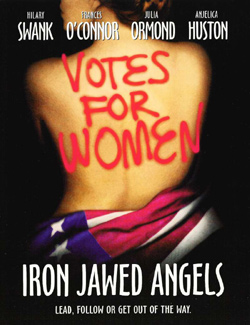
Iron Jawed Angels is a 2004 American historical drama film directed by Katja von Garnier. The film stars Hilary Swank as suffragist leader Alice Paul, Frances O'Connor as activist Lucy Burns, Julia Ormond as Inez Milholland, and Anjelica Huston as Carrie Chapman Catt. It received critical acclaim after the film premiered at the 2004 Sundance Film Festival.

The National Woman's Party (NWP) was an American women's political organization formed in 1916 to fight for women's suffrage. After achieving this goal with the 1920 adoption of the Nineteenth Amendment to the United States Constitution, the NWP advocated for other issues including the Equal Rights Amendment. The most prominent leader of the National Woman's Party was Alice Paul, and its most notable event was the 1917–1919 Silent Sentinels vigil outside the gates of the White House.

Lucy Burns was an American suffragist and women's rights advocate. She was a passionate activist in the United States and the United Kingdom, who joined the militant suffragettes. Burns was a close friend of Alice Paul, and together they ultimately formed the National Woman's Party.

The Silent Sentinels, also known as the Sentinels of Liberty, were a group of over 2,000 women in favor of women's suffrage organized by Alice Paul and the National Woman's Party, who nonviolently protested in front of the White House during Woodrow Wilson's presidency starting on January 10, 1917. Nearly 500 were arrested, and 168 served jail time. They were the first group to picket the White House. Later, they also protested in Lafayette Square, not stopping until June 4, 1919 when the Nineteenth Amendment to the United States Constitution was passed both by the House of Representatives and the Senate.

Nell Fidelia Mercer was an American suffragist. A member of the Silent Sentinels, she picketed Woodrow Wilson's White House in support of women's suffrage in the United States.

Mabel Vernon was an American suffragist, pacifist, and a national leader in the United States suffrage movement. She was a Quaker and a member of the National American Woman Suffrage Association. Vernon was inspired by the methods used by the Women's Social and Political Union in Britain. Vernon was one of the principal members of the Congressional Union for Women Suffrage (CUWS) alongside Olympia Brown, Inez Milholland, Crystal Eastman, Lucy Burns, and Alice Paul, and helped to organize the Silent Sentinels protests that involved daily picketing of Woodrow Wilson's White House.
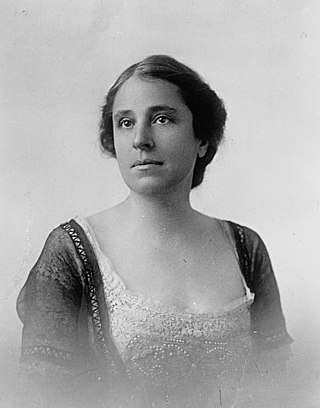
Abby Pearce Scott Baker was an American suffragist and women's rights advocate. She served as Political Chair of the National Woman's Party, and played a key role in putting the NWP in the media spotlight in the months leading up to the ratification of Nineteenth Amendment to the United States Constitution. She was also active in the Congressional Union for Women's Suffrage. Baker was seen as instrumental in bridging the gap across administrations, from Woodrow Wilson, who was deeply hostile toward the NWP, to Harding, who was seen as more willing to engage the NWP in dialogue, and brought women's participation in party politics to a more acceptable place in the public discourse.

Betty Gram Swing, born Myrtle Eveline Gram, was an American militant suffragist.
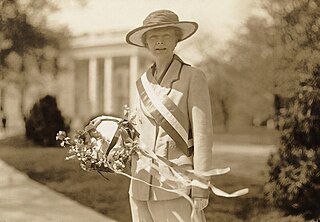
Joy Young Rogers was an American suffragette. She served as an assistant editor of The Suffragist.

Alison Turnbull Hopkins was an American suffrage activist, known as one of the Silent Sentinels for her protests at the White House.

Ruza Wenclawska, more widely known as Rose Winslow and later as Rose Lyons by marriage, was a Polish-American suffragist, factory inspector and trade union organizer. She was a dedicated member of the National Woman's Party. Wenclawska's main goal within this organization was to advocate fair treatment in the workplace for women. She also worked as an actress and a poet.
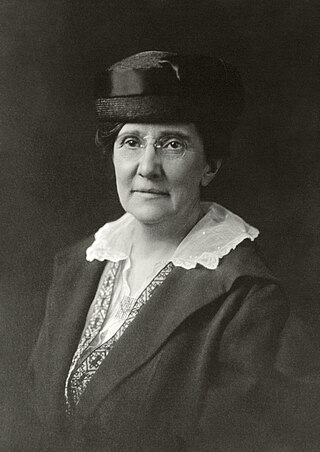
Caroline Spencer was an American physician and suffragist who campaigned extensively for women's rights, both in her home state of Colorado and on the national level. She was one of many Silent Sentinels who demonstrated in front of the White House, and also participated in Watchfires, during the final months before the Nineteenth amendment was passed. She was inducted into the Colorado Women's Hall of Fame in 2006.

Matilda Hall Gardner (1871–1954) was an American suffragist and a member of the national executive committee of the National Woman's Party.
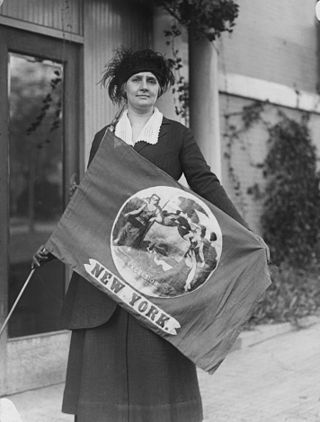
Edith M. Ainge (1873–1948) was an American suffragist and a Silent Sentinel. Ainge joined the National Woman's Party NWP led by Alice Paul, aiming to get the 19th amendment ratified. Ainge was arrested approximately five times from September 1917 to January 1919 for "unlawful assembly" at NWP protests, and she eventually went on to serve as treasurer of the NWP.

The "Prison Special" was a train tour organized by suffragists who, as members of the Silent Sentinels and other demonstrations, had been jailed for picketing the White House in support of passage of the federal women's suffrage amendment. In February 1919, 26 members of the National Woman's Party boarded a chartered train they dubbed the "Democracy Limited" in Washington, D.C. They visited cities across the country where they spoke to large crowds about their experiences as political prisoners at Occoquan Workhouse, and were typically dressed in their prison uniforms. The tour, which concluded in March 1919, helped create support for the ratification effort that ended with the adoption of the Nineteenth Amendment on August 26, 1920.

Jailed for Freedom is a book by Doris Stevens. Originally published in 1920, it was reissued by New Sage Press in 1995 in commemoration of the 75th anniversary of the 19th Amendment to the U.S. Constitution. The commemorative edition was edited by Carol O'Hare to update the language for a modern audience. Jailed for Freedom will be reissued again in 2020 by Black Dog & Leventhal in a 100th anniversary edition.
Amelia "Mimi" Himes Walker was an American suffragist and women's rights activist. Walker was one of the Silent Sentinels who picketed outside of the White House for women's right to vote. She was arrested in 1917 and sentenced to 60 days in the workhouse. After women secured the right to vote, Walker continued to honor the efforts of the suffragists. She also promoted the Equal Rights Amendment (ERA).

Eunice Dana Brannan was a feminist activist and a prominent figure in the suffragist movement in New York City. She played an important role in organizing picketings at the White House in protest of president Woodrow Wilson's refusal to support women's suffrage.
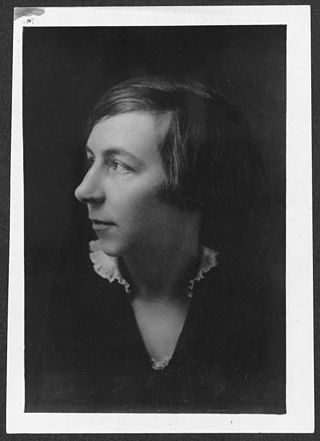
Julia Ridgely Emory was an American suffragist from Maryland, who led protests in Washington, D.C., for women's right to vote.




















